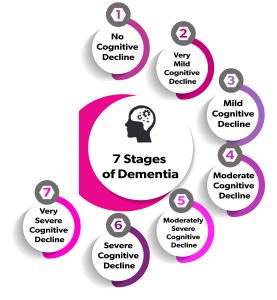
Dementia is a neurological condition that involves a decline in memory and the ability to perform activities of daily living (ADLs). Alzheimer’s disease is one of the leading causes of dementia. It accounts for 60 to 70% of the 10 million new cases of dementia reported yearly.
The stages of dementia and their associated symptoms can vary. Sometimes, decline may occur after some period of stability. Therefore, understanding the different stages of dementia is crucial for the timely care and planning of your loved ones.
This article includes the 7 stages of dementia chart, the symptoms in each stage, management tips, and other valuable insights to help patients and their families manage the progression of dementia.
Early Signs of Alzheimer’s and Dementia
The Complete 7 Stages of Dementia Chart

Here’s what you need to know about each stage of dementia:
Stage 1: No Cognitive Decline
This stage of dementia, also known as the preclinical stage, has no noticeable symptoms. The person can perform daily activities normally as there’s no memory loss or confusion.
Stage 2: Very Mild Cognitive Decline
The patient experiences mild memory loss, such as forgetting names or misplacing items. These symptoms usually do not affect activities of daily living. The affected patients can perform well in their memory tests during the interview with the healthcare provider.
Stage 3: Mild Cognitive Decline
Stage 3 involves observable issues with memory, difficulty concentrating, communication issues, and trouble with complex tasks. At this point, friends and family may notice the changes in the patient’s mood or behavior. The patient requires occasional help with complex tasks.
Stage 4: Moderate Cognitive Decline
This stage involves a clear decline in cognitive function. The patient experiences difficulty with daily activities, social withdrawal, and moodiness.
Stage 5: Moderately Severe Cognitive Decline
In this stage, the patients experience big gaps in memory, disorientation, and difficulty with daily activities. This stage is referred to as moderate dementia.
Stage 6: Severe Cognitive Decline
Stage 6 is referred to as moderately severe dementia. It includes symptoms like severe memory loss, changes in personality, and confusion about surroundings.
Stage 7: Very Severe Cognitive Decline
This final stage of dementia includes symptoms like losing the ability to respond to the environment, speak, or control movement. The affected individual has abnormal reflexes and is unable to smile or swallow.
Keep in mind that the progression and symptoms of various types of dementia may vary, so the 7 stages of vascular dementia chart may differ from the one for Alzheimer’s disease.
Care Needs and Support Tips by Stage
The following are some important care and support tips related to the 7 stages of dementia progression chart:
Early Stages (1–3)
Care Needs
- Patients require minimal assistance in these stages. The affected individuals often remain independent.
- They may need help with complex tasks like managing finances.
Support Tips
- Encourage independence and develop consistent routines for the patients to provide structure.
- Use memory aids like calendars and notes.
- Encourage and support social engagements and physical activity.
Middle Stages (4–5)
Care Needs
- The patients require regular assistance with daily activities. Their memory and behavior changes become more pronounced.
- Patients have to be under supervision to ensure safety.
Support Tips
- Use memory aids like labels and calendars.
- Implement safety measures for the patients so they don’t wander away.
- Use clear, simple communication with the patients.
Late Stages (6–7)
Care Needs
- The affected individuals need full-time care. They may lose the ability to communicate and perform basic functions at this level.
- They’ll need assistance with movement and eating.
Support Tips
- Offer the patient comfort and support to improve the quality of life, and ensure proper nutrition and hydration.
- Using non-verbal communication methods, such as touch and facial expressions, can help manage the patients.
- Help the patient maintain good oral hygiene to prevent infections.
How Nurse Next Door Can Help Throughout the 7 Stages of Dementia Chart
With over 55 million people globally living with dementia, professional home health care services play a key role in managing the condition and improving patients’ overall health.
Nurse Next Door offers 24/7 in-home care services, including personalized dementia care plans. Our unique approach prioritizes independence while professional caregivers assist with daily tasks, emotional support, and memory stimulation. Explore Nurse Next Door’s in-home Alzheimer’s and dementia care services today to connect your loved one with the most suitable and compassionate caregivers. We can make a significant difference, no matter where your loved one is on the 7 stages of dementia chart.
Conclusion
Currently, over 6.7 million seniors in the US are living with Alzheimer’s disease. If your loved one is among them, consider opting for professional home care services. As highlighted in the 7 stages of dementia progression chart, the symptoms experienced by your loved one change with time. Nurse Next Door’s caregivers assess your loved one’s needs, create a personalized in-home dementia care plan, and make adjustments as their needs evolve. Book a Caring Consult today.



